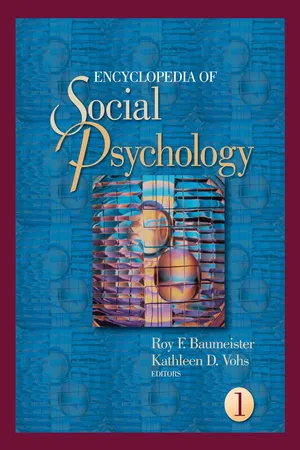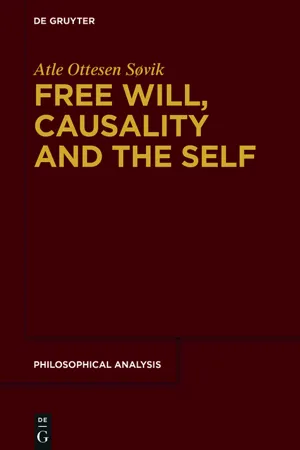Psychology
Identity and Free Will
Identity refers to the sense of self and the characteristics that define an individual. Free will is the ability to make choices and decisions independently. In psychology, the relationship between identity and free will is a topic of interest, as it explores how individuals perceive themselves and the extent to which they believe they have control over their actions and choices.
Written by Perlego with AI-assistance
Related key terms
1 of 5
3 Key excerpts on "Identity and Free Will"
- eBook - PDF
- Christian List(Author)
- 2019(Publication Date)
- Harvard University Press(Publisher)
21 In short, free will, according to common sense, is a central human capacity, no less central than the capacities for thought and language. The challenge for science and philosophy is to clarify whether we really have this capacity and, if so, how it fits into the rest of our scientific worldview. 22 Free Will versus Social Freedom Before discussing the requirements of free will in more detail, I want to distinguish free will from some other notions of freedom. Free will must not be confused with social, political, or economic freedom. It is worth briefly explaining what those other kinds of freedom are. They all have to do with the constraints and opportunities we face in our social, po-litical, or economic environments, and they are something that most of us care about a lot. For brevity, I shall simply speak of “social freedom.” When Freedom House, an influential nongovernmental organization, rates diferent countries in terms of their freedom, what it is concerned with is social freedom, not free will in the psychological or agential sense discussed in this book. The claim that North Korea ofers very little so-cial freedom is not a claim about the psychological capacities of North Koreans as human agents. Their psychological capacities are the same as those of everyone else. Rather, the claim about North Koreans’ lack of social freedom is a claim about the severe constraints they face in their social, political, and economic environment, and about the limited op-portunities they have. 23 Free Will 21 How exactly to define freedom in this social sense is a contested matter, and proponents of diferent political viewpoints argue vigorously about it. But few political thinkers would deny that social freedom is valu-able; they only quarrel about what the right definition of social freedom is. 24 Some, for example, think that social freedom merely requires the ab-sence of external constraints, while others think that it requires substan-tive opportunities as well. - eBook - PDF
- Roy F. Baumeister, Kathleen D. Vohs, Roy Baumeister, Kathleen D. Vohs(Authors)
- 2007(Publication Date)
- SAGE Publications, Inc(Publisher)
The core idea behind free will is that people can choose to act in different ways. The opposite belief is determinism, which holds that every action is fully caused (determined) by prior events. Think of something you did recently, even perhaps picking up this entry to read. Is it possible that you could have done something differently? Or was it an inevitable result of forces and pressures operating on you, including both the current situation and past experiences and lessons? You may have felt as though you made a decision to read this, but then again that feeling might be an illusion. Strict determinists think that it was inevitable that you read this and that you really could not have done anything else. In contrast, if you have free will, then you might well have done something different. The “will” part of free will presents additional problems for some philosophers and psychologists. It implies that there is such a thing as a will, as a part of the human mind, possibly located somewhere in the brain. Many experts believe that the will is just a metaphor or a convenient way of talking about human mental processes, rather than being something real. Those experts hence reject the term free will and pre-fer to talk about freedom of action. Some of them think that freedom is real and the will is not real. For most, however, the issue is whether freedom really exists, and the “will” part is not the controversial part. Opposition to Free Will Social psychologists who reject the idea of free have several main reasons for doing so. One is a simple act of faith. Many psychologists believe that, as scientists, they must believe that there is a cause for everything and that determinism is the only suitable assumption for scientific research. Most agree that determinism cannot be proven true, but they believe that it is nec-essary for scientists to assume that it is true. Some regard free will as an obsolete religious idea. - eBook - PDF
- Atle Ottesen Søvik(Author)
- 2016(Publication Date)
- De Gruyter(Publisher)
4 Free Will The time has come to explain what it means to say that humans have free will. We have already seen the basic definition of free will: that it is up to us what we choose among alternatives and that the source of the choice is in us. Different scholars disagree on how to understand the parts of the definition, how the concept of free will should be used, and which definitions refer to a kind of free will that actually exists. For most of them, the goal is to find a coherent defini-tion of free will and to find out how free the human will is. This is also my goal and, having considered the topics of causality and the self, I now have the re-sources to explain in much greater detail who chooses, what it means to choose among alternatives , and how the choice makes the agent the source or the cause of the choice. I shall start by defining “free will” and argue that we have free will when (but not only when) the autobiographical self is the cause of the desire that makes us choose one alternative as opposed to another. In order to explain why we have free will when the autobiographical self is the cause of the desire that causes the choice, I must explain what I mean by alternative possibilities and then discuss the question of determinism. I can then explain how the autobio-graphical self becomes what it becomes and why we have free will when the autobiographical self causes the desire that causes the choice. But we have free will and responsibility not only when an independent autobiographical self causes the choices we make. After explaining what I mean by responsibility, I argue that free will is a matter of inner-directedness and exists to different de-grees along a continuum. I present and discuss different degrees of free will along this continuum and in the final chapter of the book I discuss various test cases and counterarguments to see how well I can explain typical difficult cas-es.
Index pages curate the most relevant extracts from our library of academic textbooks. They’ve been created using an in-house natural language model (NLM), each adding context and meaning to key research topics.


